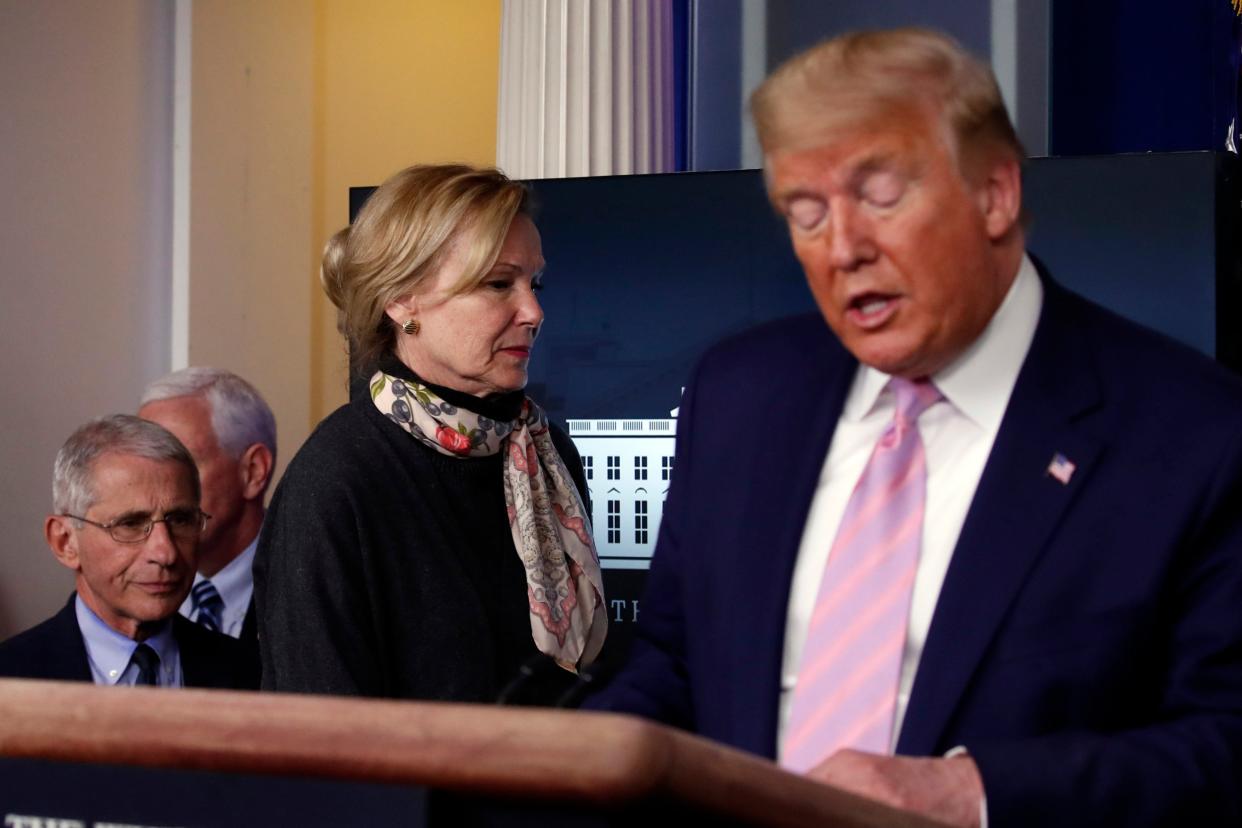Coronavirus: Kudlow claims White House is 'guided by the facts' as Trump gambles on unproven drug

One of Donald Trump's closest advisers on Monday claimed the White House's coronavirus task force is "guided by the facts." But the president's own claims from two wild weekend news conferences suggests he is basing many of his assumptions and predictions on his instincts – and total guesswork.
Mr Kudlow, one of the task force members, noted again on Monday that implementing quickly built relief programs established in recent weeks via emergency legislation negotiated by the Trump administration and Congress will take time. And he has been upfront that there have been some "glitches" -- and more will inevitably follow.
But when it comes to just what is guiding the task force's response, the group's members and their boss often seem miles apart. They view meticulously gathered data points as fact; he appears to view what his gut tells him as even more authoritative.
"So they're working on their execution. We're all being guided by the facts, and the economics team has been working, too," Mr Kudlow, also Mr Trump's chief economic adviser, told reporters Monday.
But the president often seems far detached from following his scientific and other coronavirus advisers.
Take Mr Trump's focus on hydroxychloroquine, a malaria drug not yet approved by the US Food and Drug Administration (FDA) to treat coronavirus.
"We are just hearing really positive stories and we are continuing to collect the data, but I will just speak for myself. It has been out for a long time," Mr Trump said Saturday. "It is a malaria drug, it is also a drug for Lupus and ... there's a study out that people with Lupus aren't catching this horrible virus."
Mr Trump again flashed his skepticism of science and long-held medical practices by saying of that unidentified study, "maybe that is correct, maybe it is false."
"But there's a lot of very positive things happening with that," he said before again claiming the drug "is a game changer, if that is the case."
But Anthony Fauci, the top US infectious disease expert, and other task force leaders have cautioned reporters and the public from putting their hopes in hydroxychloroquine just yet.
Perhaps that's why, during a Sunday night news conference, Mr Trump stepped in front of Mr Fauci and did not allow him to ask a reporter's question about whether he shares the president's views about the malaria drug.
"He's answered that question 15 times," Mr Trump told the reporter hours after Mr Fauci said this on CBS's "Face the Nation" program: "The data are really, just, at best, suggestive. There have been cases that show there may be an effect and there are others to show there's no effect."
Then came a line that undercut the president's sales pitch for the drug: "So, I think in terms of science," Mr Fauci said, "I don't think we could definitively say it works."
Still, members of the task force find ways to echo the boss even as their approaches to combating a disease that has left – officially – 338,995 sick and 9,683 dead in the United States.
"There's also the point of view that we are in war. President Trump is a wartime president, in the fog of war. We might take more risks than we otherwise would," one of his top trade advisers, Peter Navarro, said Monday during a television interview. "And, given the track record of the drug over many, many years treating malaria, and there are side effects, but it's been used a lot in lesser doses, the decision's been made by many doctors to prescribe ... it. And if it saves lives, that's a beautiful thing."
Mr Navarro's use of "beautiful" was straight out of his boss's vernacular.
"I think history will judge who's right on this debate, but I'd bet on President Trump's intuition on this one," he said in a shot at all the members of the task force with a medical or scientific background, "because of all the doctors I've talked to and all the scientific papers I've read, and they're about this high."
Others often get in on the act, too.
"We've been looking at various best ways and best practices ways to open up the economy for economic activity," Mr Kudlow said after Mr Trump over the weekend veered back to almost demanding parts of the US economy and daily life return to normal. "As the president has said, we don't want the cure to be worse than the problem."
Read more
Trump takes coronavirus break to again question Joe Biden’s competence
Taliban accuses Trump administration of pushing peace deal to breaking
US denies diverting masks headed for Germany to tackle Covid-19
Trump touts unproven drug in coronavirus briefing
Trump's former economic adviser claims US facing 'Great Depression'

